Medical news September 23: Hold leaders accountable for shortages of medicine and medical supplies
The Ministry of Health requires heads of medical examination and treatment facilities to take responsibility if there is a shortage of drugs, chemicals, testing supplies, medical equipment and related services.
Clearly define the responsibilities of leaders when there is a shortage of drugs and medical supplies.
Deputy Minister of Health Le Duc Luan has just signed and issued a document on the implementation of Directive 24/CT-TTg dated July 29, 2024 of the Prime Minister on promoting and improving the effectiveness and efficiency of the implementation of the Law on Bidding to units under and directly under the Ministry of Health; Project Management Boards under the Ministry of Health and Departments of Health of provinces and centrally run cities.
 |
| The Ministry of Health requires heads of medical examination and treatment facilities to promote and strictly manage the organization of procurement and bidding, ensuring publicity, transparency, efficiency, and avoiding waste. |
According to the Ministry of Health, in recent times, to overcome difficulties and obstacles in procurement, bidding and the shortage of drugs, supplies and medical equipment; the National Assembly, the Government, the Ministry of Planning and Investment, and the Ministry of Health have issued, under their authority, many legal documents and guidance documents on bidding in general and bidding for the purchase of drugs and medical equipment;
To overcome the shortage of drugs and medical supplies, the Ministry of Health requested the Department of Planning and Finance to preside over and coordinate with relevant units to review the detailed regulations and instructions for implementing the Law on Bidding and Decree No. 24/2024/ND-CP to propose to competent authorities to amend and supplement (if any) to better suit the actual procurement of drugs, testing supplies, and medical equipment.
At the same time, preside over and coordinate with the Legal Department, the Department of Drug Administration, and the Department of Traditional Medicine Management to review the provisions in Circular No. 07/2024/TT-BYT to amend and supplement (if any) to make them more suitable to reality;
Preside over and coordinate with the Legal Department, the Drug Administration Department, the Traditional Medicine Administration Department, the Department of Infrastructure and Medical Equipment to research, develop and submit to the Ministry of Health for promulgation a Handbook on internal bidding procedures for the procurement of drugs, testing supplies and medical equipment, ensuring clear identification of the sequence, procedures, time and responsibilities for implementation for general application to hospitals under the management of the Ministry of Health and for other hospitals to refer to and apply.
Preside over and advise the Ministry of Health on solutions to enhance the capacity of staff participating in bidding work of the industry and units managed by the Ministry.
Regularly monitor and guide the implementation of the law on bidding under the authority of the Ministry of Health to promptly remove difficulties and obstacles, overcome loopholes and shortcomings; regularly monitor bidding activities when detecting signs of not ensuring the goals of competition, fairness, transparency and economic efficiency to take timely corrective measures.
Preside over the development of plans and conduct inspections and supervision of bidding work for units under the management of the Ministry of Health.
The Ministry of Health assigned the Legal Department to strengthen the dissemination of laws and provide training to improve the capacity of bidding staff in implementing legal regulations on bidding.
The Department of Infrastructure and Medical Equipment shall develop and submit to the Ministry of Health for promulgation a Circular regulating the list of national centralized procurement of medical equipment and testing supplies when necessary (instructions in Point a, Clause 2, Article 53 of the Law on Bidding);
Submit to the Ministry of Health for promulgation of guidelines on classifying medical equipment according to technical and quality standards to perform the assigned tasks at Point d, Clause 2, Article 135 of Decree No. 24/2024/ND-CP; to be completed in the third quarter of 2025.
Closely manage and monitor the disclosure, declaration, and re-declaration of prices of testing supplies and medical equipment in accordance with market prices to prevent unreasonable price increases.
The Drug Administration and the Traditional Medicine Administration shall closely manage and supervise the public disclosure, declaration, and re-declaration of drug prices, medicinal herbs, and traditional medicines in accordance with market prices to prevent unreasonable price increases;
Review and propose amendments to the Bidding Document Forms and Request Documents for bidding on drugs, herbal medicines, and traditional medicines to make them more suitable to reality; to be completed in the fourth quarter of 2024.
Timely and thoroughly rectify existing shortcomings and limitations in bidding work under the management of the Ministry of Health.
The Department of Medical Examination and Treatment shall preside over and coordinate with the National Drug Centralized Procurement Center and relevant units to guide the use and replacement of drugs (for example: using Group 2 drugs instead of Group 1; drugs with low concentration and content instead of drugs with high concentration and content) to serve the work of synthesizing centralized procurement needs, ensuring savings and efficiency; to be completed in the first quarter of 2025.
In this document, the Ministry of Health requested the Ministry's Office to review and advise the Ministry of Health to minimize cumbersome administrative procedures that cause inconvenience and difficulty in carrying out procedures for purchasing drugs, testing supplies, and medical equipment.
The Ministry Inspectorate shall strengthen the organization of inspections on bidding work according to regulations. Inspections must ensure requirements and quality, in order to detect limitations, shortcomings and violations in order to propose timely handling measures.
Strengthen the role of inspection, examination and supervision agencies in implementing inspection conclusions and handling violations according to their authority. Strictly handle organizations and individuals who violate the responsibilities specified in Clause 3, Article 87 of the Law on Bidding, ensuring timely and thorough correction of existing shortcomings and limitations in bidding work under the management of the Ministry of Health.
Regularly grasp information, feedback and recommendations on negative behaviors and violations in bidding for timely verification and handling. In case of necessity or serious violations are detected, proactively propose surprise inspections or transfer to the investigation agency for consideration and handling according to the provisions of law.
National drug procurement units shall proactively and promptly conduct national centralized procurement of drugs, testing supplies, and medical equipment on the national centralized procurement list and other cases requiring centralized procurement as prescribed in Clause 5, Article 53 of the Law on Bidding (HIV/AIDS drugs, tuberculosis treatment drugs, etc.), ensuring that there is no shortage of drugs, chemicals, testing supplies, and medical equipment.
Proactively and promptly organize price negotiations for drugs, testing supplies, and medical equipment according to the price negotiation list according to the tasks assigned by the Ministry of Health in Decision No. 2331/QD-BYT dated August 7, 2024.
Regularly notify the plan and progress of national centralized procurement, price negotiations, and ensure compliance with treatment requirements as prescribed in Clause 2, Article 94 of Decree No. 24/2024/ND-CP.
Strictly manage the organization of procurement and bidding, ensure publicity, transparency, efficiency, and avoid waste. The Ministry of Health requires promoting online bidding, taking advantage of the features of the National Bidding Network System to increase publicity and transparency.
For heads of medical examination and treatment facilities, fully perform the responsibilities of competent persons (in case of decentralization), the responsibilities of investors and bidding parties in contractor selection activities, ensuring adequate medicines, chemicals, testing materials, medical equipment and other related services for medical examination and treatment...
Promote and strictly manage the organization of procurement and bidding, ensuring publicity, transparency, efficiency, and avoiding waste; take responsibility for any shortage of drugs, chemicals, testing supplies, medical equipment, and related services at medical facilities under management.
Promote online bidding, take advantage of the features of the National Bidding Network System to increase publicity and transparency, ensuring convenience in selecting contractors to supply drugs, chemicals, testing materials, and medical equipment.
At the same time, measures and mechanisms must be in place to promptly handle situations arising during bidding at medical facilities; and to avoid prolonged delays that could lead to a shortage of drugs, chemicals, testing supplies, and medical equipment for medical examination and treatment.
Strengthen training and improve professional expertise in bidding for individuals directly involved in bidding and purchasing activities.
Post information on handling violations of contractors and investors in accordance with responsibilities and send it to the Ministry of Planning and Investment for monitoring.
Detected myocarditis with fever
A male patient in Ho Chi Minh City had a sore throat and pain in his left chest when he took a deep breath or changed position. Thinking he had Covid-19, he bought medicine and took it for 5 days, and his symptoms improved. He thought he was cured so he went about his daily activities as usual, even going out drinking with friends.
When he got home, he had intermittent chest pains and his body temperature was still around 38-39 degrees. He went to a medical facility and was tested for dengue fever, which came back negative. The doctor diagnosed him with a viral fever and prescribed antibiotics. After a day, his condition did not improve, so he went to Tam Anh General Hospital in Ho Chi Minh City for a check-up.
Resident doctor Pham Cong Danh, Department of Cardiology, Cardiology Center, said the patient was admitted with sharp chest pain when breathing deeply, very fast heart rate (110 beats/minute). Echocardiography showed moderate pericardial effusion.
After performing paraclinical tests to rule out myocardial infarction, pneumothorax and aortic dissection, the doctor diagnosed Mr. Phong with acute pericarditis.
This is a condition in which the pericardium is inflamed, with increased fluid secretion in the pericardial cavity, requiring timely treatment to avoid complications of acute cardiac tamponade and long-term complications such as constrictive pericarditis.
Common causes of pericardial effusion are pericarditis due to infection (virus, bacteria, tuberculosis, fungus, HIV infection...), autoimmune diseases such as lupus erythematosus, metastatic cancer, post-traumatic (post-cardiac surgery, closed chest trauma), post-myocardial infarction and sometimes idiopathic.
The patient had been screened for cancer and found no abnormalities, and the tuberculosis test was negative. The patient had also had symptoms of fever, muscle pain, fatigue, and chest pain a week before, so Dr. Danh concluded that he was likely in the 90% group of cases of pericarditis caused by a previous viral infection.
The pericardium consists of two layers, with a small amount of lubricating fluid in between to help reduce friction and allow the two layers to slide over each other when the heart contracts. Pericardial effusion occurs when a lot of fluid accumulates between the two layers of the pericardium. If severe, it will affect heart function, causing difficulty breathing, shock, and low blood pressure.
At this time, it is necessary to perform pericardial aspiration to quickly reduce the pressure in the pericardial cavity. Thereby, reducing the pressure on the heart (acute cardiac tamponade), helping the heart return to normal function.
Master, Doctor, Specialist II Huynh Thanh Kieu, Head of Department of Cardiology 1, Cardiovascular Center, Tam Anh General Hospital, Ho Chi Minh City, assessed that the patient was alert, in stable health, without hypotension or cardiogenic shock.
Therefore, the doctor decided not to aspirate the fluid but to treat it with anti-inflammatory drugs. After one day, Mr. Phong's chest pain was 50% gone. After three days, the patient's symptoms improved by 80-90%, no more chest pain, eating well, heart rate returned to 80-90 beats/minute. Ultrasound examination showed that the pericardial effusion had decreased significantly, indicating a significant improvement in the inflammation.
Five days later, the patient was discharged and prescribed anti-inflammatory medication for at least one month. The patient was followed up one week later to monitor the pericardial effusion and inflammation.
There are two forms of pericarditis: Acute (symptoms start suddenly but do not last long) and chronic (symptoms last more than 3 months). Acute pericarditis has similar symptoms to many other heart and lung diseases such as pneumonia, myocardial infarction, etc., so it is easy to misdiagnose, delaying the treatment process.
As a result, the disease progresses to a chronic stage, causing complications such as thickening of the pericardium, limiting the heart's ability to contract. This causes the heart to lose its elasticity and function inefficiently, manifested by symptoms of severe shortness of breath, swollen legs, and ascites (accumulation of fluid in the abdomen).
Doctor Kieu emphasized that early medical examination when signs of suspected pericarditis appear helps in early diagnosis and timely treatment of the disease.
Most cases respond well to medical treatment and can be cured within a few weeks to three months. During the treatment period, patients should take adequate rest, avoid strenuous activities, not take non-prescription drugs or stop taking them, and return for follow-up appointments on schedule for monitoring.
Many people hospitalized in Bac Kan were due to staphylococcal infections.
Bac Kan Department of Health has just informed that the test results of patient samples show that the cause of nearly 70 people being hospitalized with similar symptoms is gastrointestinal infection caused by staphylococcus bacteria.
The test results of the Bac Kan Provincial Center for Disease Control showed that Staphylococcus aureus bacteria were detected in the samples. However, the source of the staphylococcus bacteria to the patients has not yet been determined. Currently, the Bac Kan Health Department is continuing to investigate and determine the source of the infection for thorough treatment.
Previously, at 11:30 a.m. on September 20, at Nong Thuong Primary and Secondary School, Bac Kan city, a number of students showed symptoms of fever, headache, and nausea.
By 5 p.m. the same day, 49 students had the same symptoms. Immediately after receiving the information, the Bac Kan City People's Committee coordinated with the Provincial Center for Disease Control to carry out sanitation, disinfection and sample collection for testing.
By the morning of September 21, the number of people showing the above symptoms had increased to 69. Of these, 29 cases were being treated at the Provincial General Hospital; 25 cases were being treated at the City Medical Center; the remaining cases were being monitored and treated at home.
On September 21, the City People's Committee issued an urgent dispatch requesting the Medical Center to strengthen monitoring, early detection of disease cases; prepare good conditions for patient admission and treatment; and coordinate with functional agencies to find the cause.
Currently, the health status of the patients has stabilized. The Bac Kan Department of Health continues to direct medical facilities to focus on treating the patients.
Source: https://baodautu.vn/tin-moi-y-te-ngay-239-quy-trach-nhiem-nguoi-dung-dau-khi-de-thieu-thuoc-vat-tu-y-te-d225591.html




![[Photo] President of the Cuban National Assembly visits President Ho Chi Minh's Mausoleum](https://vphoto.vietnam.vn/thumb/1200x675/vietnam/resource/IMAGE/2025/10/1/39f1142310fc4dae9e3de4fcc9ac2ed0)
![[Photo] Keep your warehouse safe in all situations](https://vphoto.vietnam.vn/thumb/1200x675/vietnam/resource/IMAGE/2025/10/1/3eb4eceafe68497989865e7faa4e4d0e)
![[Photo] Hanoi morning of October 1: Prolonged flooding, people wade to work](https://vphoto.vietnam.vn/thumb/1200x675/vietnam/resource/IMAGE/2025/10/1/189be28938e3493fa26b2938efa2059e)








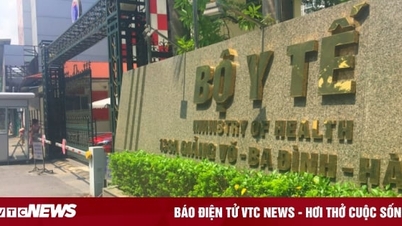



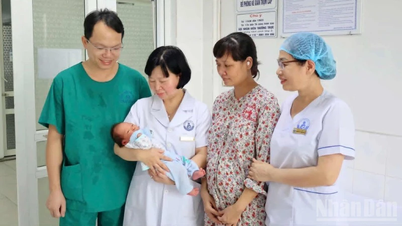

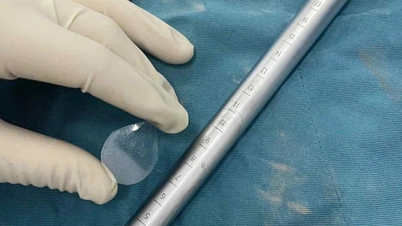


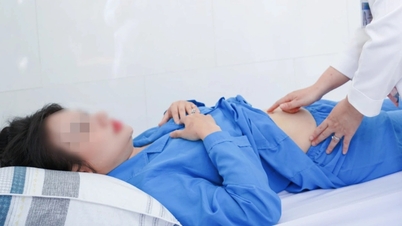
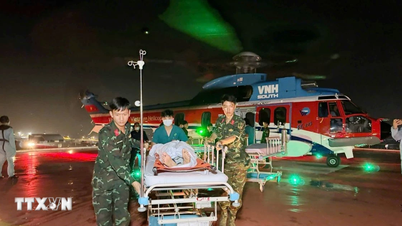














































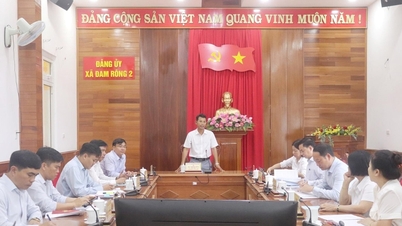

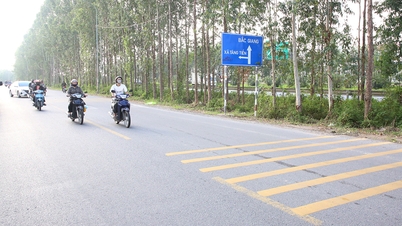

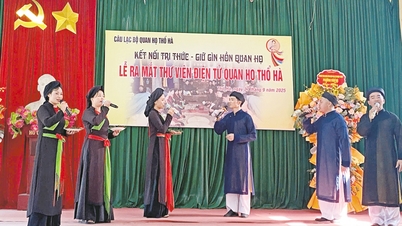


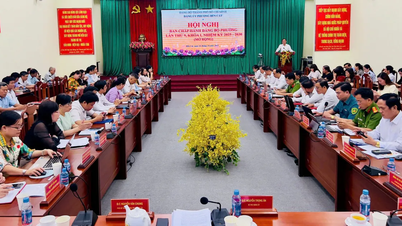













Comment (0)